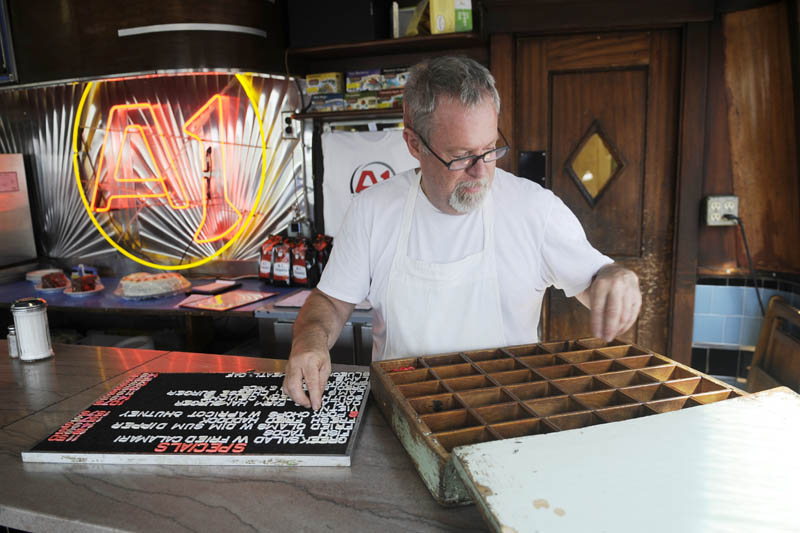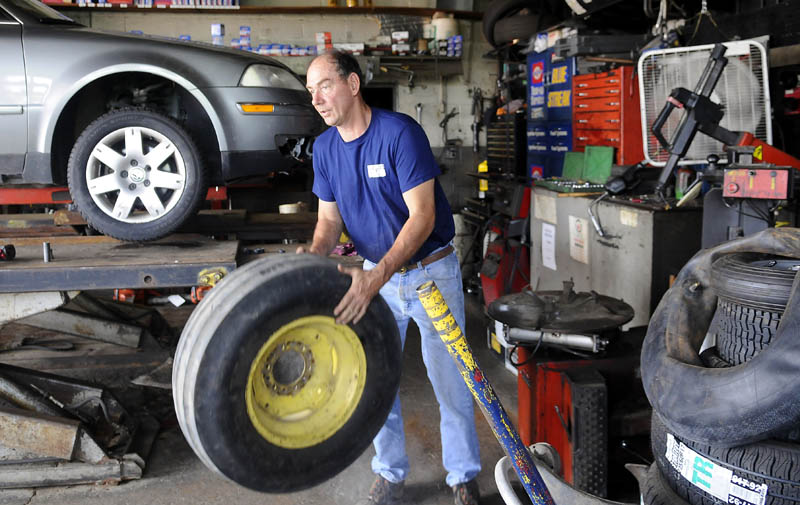GARDINER — Roger Beck held on long as he could for his customers, but the commute and the economy got to be too much.
Within a week, Beck will close the doors of his A1 to Go Community Market & Cafe at the intersection of Bridge and Water streets. “It’s just the economy is really bad,” he said.
Just up the street, at the A1 Diner on Bridge Street, co-owner Michael Giberson said sales dropped off when the recession began at the end of 2008, but never went over the cliff.
“Since then, sales have been strong,” Giberson said. “My sales have been up every month all winter and all spring and summer so far.”
As illustrated by two Gardiner business, gauging retails sales in the Augusta area is an elusive proposition.
Business owners offer insights that range from the vaguely promising to blatantly discouraging.
Even the numbers — which, on the surface, indicate a rebound from a gloomy recent past — turn much less impressive when looked at closely.
“It’s been two years since the recession ended, technically, but the recovery has been very, very slow,” said Joel Johnson of the State Planning Office. “The retail sales numbers are up from May 2010 — so at least they’re not down. But we would hope to see better growth than that.”
The planning office this week announced that, statewide, retail sales in May of this year — the latest month for which data is available — grew more than 2 percent.
Total taxable retail sales in May were $1.36 billion — up 2.2 percent from May 2010.
Why is that not necessarily good news?
“When you adjust for inflation, that 2.2 percent gets deflated to less than zero,” Johnson said.
Johnson looks at a subset of the overall data for better clues. He said the sale of building supplies is always a strong indicator of consumers’ confidence. Those sales rose 3 percent from May 2010 to May 2011.
Sales in the Augusta metropolitan area also offer a mixed bag.
A month-to-month comparison shows an uneven picture, as retail sales fell in half the months between June 2010 and May.
Sales in the Augusta area fell $1.5 million, or 0.6 percent, in May 2011 compared to May 2010. But that was after a surge that saw sales rise 2.8 percent, or $2 million, in April 2011 from April 2010.
In addition to the state numbers, national figures indicate consumer confidence continues to wobble, Johnson said.
“This is important because roughly two-thirds of the economy on a national level is consumer spending,” Johnson said. “When consumers aren’t spending, it’s going to have a big impact on the economy.”
Augusta Economic Development Director Michael Duguay said all such data can be misleading.
“What they don’t speak to, necessarily, is the larger trend,” he said.
Prior to the recession, people planned entertainment around going out to eat and shopping. That recreational spending is happening less now, Duguay said.
But anecdotally, Duguay said there are encouraging signs, including waiting lists that are now being created again at many city restaurants on weekends.
“Augusta is very strong in retail,” Duguay said. “When you look at our ability to have weathered the deep cuts the last few years, we’re still standing.”
Large retailers are once again beginning to consider expansion, Duguay said, but they are no longer willing to gamble on smaller markets.
“Because Augusta is established, I think we’re in a very good position for them to locate stores here,” Duguay said. “We’ve weathered the storm. I think we’ve weathered it very well as compared to nationally.
“As the economy starts to get stronger, we’re starting to hear from other retailers who have been silent the last few years. We’re on the top list of where they will locate.”
Drawing larger retailers to the area will enhance Augusta’s reputation as a service center for the region, Duguay said.
“Having them come to retail centers allows us to get their attention downtown,” Duguay said. “It’s difficult when you don’t show up to Augusta to begin with. I need your attention first.”
But Beck cautioned that spending money at national brands — be it stores or restaurants — is not as readily transferred back to the community as money spent at independent local stores.
“I think a lot of people don’t understand that,” he said.
Giberson said he has heard from some restaurant owners who say business is off, and others who say business is strong.
Giberson knows a produce seller who said the business is “thriving.”
“I hear from some of my suppliers from other parts of the state the sales are not great,” Giberson continued. “They’re flat on the coast right now. There was a bump on the Fourth (of July), but after that it tapered off.”
If present conditions are difficult to pin down, the future is anyone’s guess.
Variables, perhaps most notably oil and energy costs, give caution to any expectation of a rebound.
But Duguay remains hopeful.
“It does seem we’ve gone through the valley,” Duguay said. “We’re coming out on the other side.”
Craig Crosby — 621-5642
ccrosby@centralmaine.com
This story was updated at 9:15 a.m., to correct information and an incorrectly attributed quote.
Send questions/comments to the editors.




Success. Please wait for the page to reload. If the page does not reload within 5 seconds, please refresh the page.
Enter your email and password to access comments.
Hi, to comment on stories you must . This profile is in addition to your subscription and website login.
Already have a commenting profile? .
Invalid username/password.
Please check your email to confirm and complete your registration.
Only subscribers are eligible to post comments. Please subscribe or login first for digital access. Here’s why.
Use the form below to reset your password. When you've submitted your account email, we will send an email with a reset code.